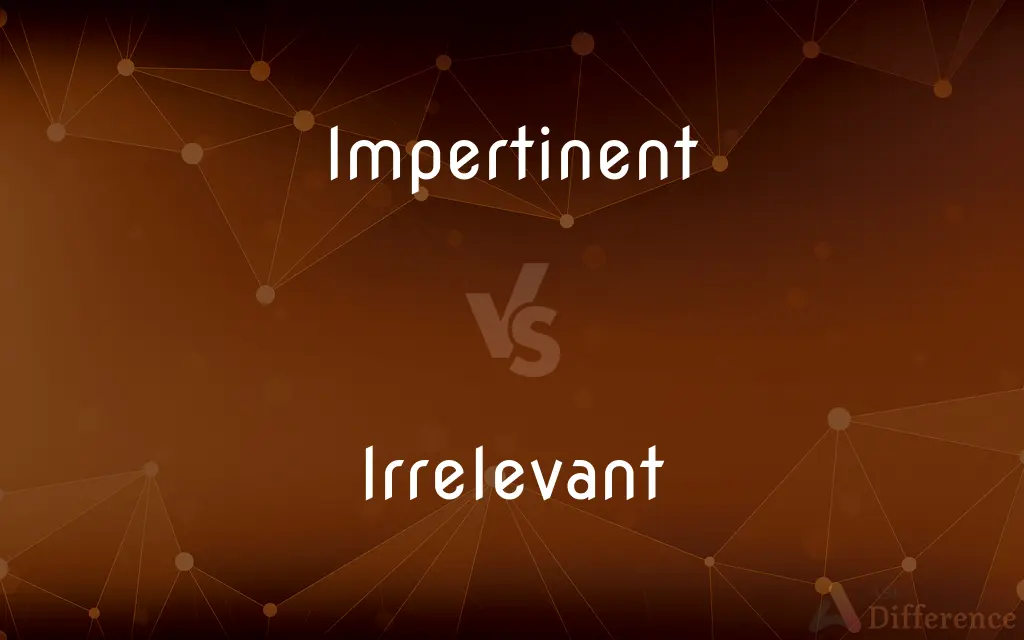Impertinent vs. Irrelevant — What's the Difference?
By Tayyaba Rehman & Maham Liaqat — Updated on April 17, 2024
Impertinent describes behavior or remarks that are rude and disrespectful, while irrelevant refers to something that is not connected or pertinent to the matter at hand.

Difference Between Impertinent and Irrelevant
Table of Contents
ADVERTISEMENT
Key Differences
Impertinent typically describes behavior or comments that are bold and disrespectful, often in a way that transgresses the bounds of decorum or politeness. On the other hand, irrelevant pertains to information, statements, or topics that do not relate to the current subject or context and have no bearing on the issue being discussed.
While impertinence can disrupt social harmony and personal interactions by offending individuals through unsuitable or intrusive remarks, irrelevance disrupts the flow of conversation or analysis by introducing topics or data that divert focus from the main points.
Impertinent remarks or actions often result from a deliberate choice to ignore social cues and boundaries, reflecting a lack of respect for others’ feelings or status. In contrast, irrelevant information might not always stem from a deliberate act but can be a result of misunderstanding the topic or poor judgment regarding what is significant in a particular discussion.
In a social setting, someone who is impertinent might be perceived as rude or uncivil, which can damage relationships and social standings. Meanwhile, introducing irrelevant details in academic or professional contexts might be seen as a lack of understanding or preparation, affecting one’s credibility or the efficiency of communication.
While impertinent behavior directly impacts interpersonal interactions by challenging social norms, irrelevance primarily affects the content and utility of communication, potentially leading to confusion or inefficiency in conveying or gathering information.
ADVERTISEMENT
Comparison Chart
Definition
Rude and disrespectful in manner or speech.
Not connected or applicable to the matter at hand.
Contextual Impact
Affects social interactions and personal relationships.
Affects the clarity and relevance of information exchange.
Origin of Behavior
Often intentional disregard for propriety.
Often unintentional, due to lack of knowledge or focus.
Perception
Viewed as rude or inappropriate.
Viewed as distracting or unhelpful.
Outcome
Can damage social rapport and respect.
Can lead to misunderstanding or inefficiency.
Compare with Definitions
Impertinent
Not showing proper respect or manners.
It was considered impertinent to interrupt while someone else was speaking.
Irrelevant
Not related to the subject at hand.
The discussion was interesting, but it was irrelevant to the main topic of the meeting.
Impertinent
Acting without consideration of others.
He was often impertinent, asking personal questions that made others uncomfortable.
Irrelevant
Not applicable or pertinent.
Irrelevant details in his essay caused him to receive a lower grade.
Impertinent
Offensively bold behavior.
Her impertinent behavior at the dinner party embarrassed her host.
Irrelevant
Not contributing to a discussion or issue.
She often shared anecdotes that were entertaining yet irrelevant to our project’s goals.
Impertinent
Showing a lack of respect; rudely bold.
The student's impertinent question about the teacher’s age soured the classroom atmosphere.
Irrelevant
Lacking importance in the current context.
His comments were deemed irrelevant and were ignored during the debate.
Impertinent
Inappropriately forward or bold.
His impertinent remarks at the meeting were met with disapproving looks.
Irrelevant
Superfluous or unnecessary within a context.
Adding irrelevant statistics only muddied the clarity of her presentation.
Impertinent
Not showing proper respect; rude
An impertinent question
Irrelevant
Unrelated to the matter being considered.
Impertinent
Not pertinent to a particular matter; irrelevant
Talk of ‘rhetoric’ and ‘strategy’ is impertinent to this process
Irrelevant
Not relevant, as:
Impertinent
Exceeding the limits of propriety or good manners; improperly forward or bold
Scolded the impertinent child for talking rudely.
Irrelevant
Not at all related: totally unrelated, wholly unconnected, completely inapplicable.
Impertinent
Not pertinent
Irrelevant
Not usefully related: not associated in any way that is important or useful to the context being discussed: not materially applicable; having connections not applicable in the present situation.
Impertinent
Insolent, ill-mannered.
Irrelevant
Having no bearing on or connection with the subject at issue;
An irrelevant comment
Irrelevant allegations
Impertinent
Irrelevant, useless.
Impertinent
An impertinent individual.
Impertinent
Not pertinent; not pertaining to the matter in hand; having no bearing on the subject; not to the point; irrelevant; inapplicable.
Things that are impertinent to us.
How impertinent that grief was which served no end!
Impertinent
Contrary to, or offending against, the rules of propriety or good breeding; guilty of, or prone to, rude, unbecoming, or uncivil words or actions; as, an impertient coxcomb; an impertient remark.
Impertinent
Trifing; inattentive; frivolous.
Impertinent
An impertinent person.
Impertinent
Characterized by a lightly pert and exuberant quality;
A certain irreverent gaiety and ease of manner
Impertinent
Not pertinent to the matter under consideration;
An issue extraneous to the debate
The price was immaterial
Mentioned several impertinent facts before finally coming to the point
Impertinent
Improperly forward or bold;
Don't be fresh with me
Impertinent of a child to lecture a grownup
An impudent boy given to insulting strangers
Common Curiosities
Can a statement be both impertinent and irrelevant?
Yes, a statement can be both if it is disrespectful and also not pertinent to the topic at hand.
Why is it important to avoid irrelevant information in communications?
Avoiding irrelevant information helps maintain focus, clarity, and effectiveness in communication.
What makes a comment impertinent instead of irrelevant?
A comment is impertinent when it's disrespectful or rude, whereas it's irrelevant when it doesn't pertain to the subject matter.
Can cultural differences influence perceptions of impertinence?
Yes, what is considered impertinent can vary greatly across different cultures, depending on social norms and values.
How can one improve their ability to stay relevant in discussions?
Staying informed on the topic, actively listening, and focusing on the main points can help maintain relevance in discussions.
Is impertinence ever acceptable?
While sometimes viewed as a form of assertiveness, impertinence is generally unacceptable as it disrespects others and violates social norms.
What skills can help someone avoid giving irrelevant responses?
Critical thinking, active listening, and clear understanding of the subject matter can prevent irrelevant responses.
What is an example of impertinence in customer service?
An employee speaking dismissively to a customer is an example of impertinence.
Can irrelevance be strategic in some communications?
Sometimes, irrelevance can be used strategically to divert or lighten a discussion, although it generally should be used cautiously.
How does one discern if a detail is irrelevant in technical discussions?
A detail is irrelevant if it does not directly contribute to solving the problem or understanding the topic.
How should one handle impertinent remarks in a professional setting?
Impertinent remarks should be addressed calmly and professionally, possibly by setting clear boundaries or discussing the behavior in private.
What are the potential consequences of impertinent behavior in social settings?
Impertinent behavior can lead to social alienation, damaged relationships, and a negative reputation.
What are common reactions to impertinent behavior?
Common reactions include annoyance, discomfort, or confrontation, depending on the severity and context.
What role does etiquette play in managing impertinence?
Proper etiquette can provide guidelines and expectations that help manage and prevent impertinent behavior.
How does irrelevance affect learning and teaching environments?
Irrelevance can distract and disengage students, making learning less effective and efficient.
Share Your Discovery

Previous Comparison
Invent vs. Devise
Next Comparison
Kitsch vs. TweeAuthor Spotlight
Written by
Tayyaba RehmanTayyaba Rehman is a distinguished writer, currently serving as a primary contributor to askdifference.com. As a researcher in semantics and etymology, Tayyaba's passion for the complexity of languages and their distinctions has found a perfect home on the platform. Tayyaba delves into the intricacies of language, distinguishing between commonly confused words and phrases, thereby providing clarity for readers worldwide.
Co-written by
Maham Liaqat













































